15 Companies Retooling Their Operations to Fight COVID-19
(Image: Face masks come off the assembly line at a Ford plant in Michigan, part of the company's efforts to retool in response to COVID-19.)
When it comes to corporate action in the face of a global crisis, it's one thing to write a check. Monetary donations are surely helpful for the nonprofits and community groups being pushed to the brink by the coronavirus pandemic, but most consider payouts in the millions of dollars as table stakes moves for multibillion-dollar companies.
A smaller group is going further by getting creative to retool their operations, supply chains, people and products to produce critical supplies needed by those on the front lines. This is by no means a comprehensive list, but these 15 companies stood out to us over the past six weeks.
H&M
Soon after the crisis hit, fast-fashion giant H&M began rearranging its supply chain to source and produce protective equipment for healthcare workers on the front lines. The first round of 100,000 face masks was delivered to Spanish and Italian hospitals two weeks ago, and an H&M supplier is in the process of producing 1 million long-sleeve, protective aprons for Swedish hospitals, the company wrote on LinkedIn.
Honeywell
While ramping up production of its N95 respirator masks, Honeywell is temporarily shifting operations at two chemical manufacturing plants to produce hand sanitizer. Sites in Muskegon, Michigan, and Seelze, Germany, will produce sanitizer over the next two months for donation to the U.S. Federal Emergency Management Agency (FEMA) and Germany's Saxony Ministry of Health, Social Affairs and Equality, according to the company.
Reformation
Los Angeles-based sustainable fashion brand Reformation connected with Mayor Eric Garcetti to form LA Protects, an effort to mobilize local manufacturers to make 5 million face masks for use in the city. The indie brand converted its LA factory to produce masks using fabrics from its nearby warehouse, and it's recruiting other garment manufacturers in the city to do the same.
As is generally the case on this list, the masks are not medical-grade and are meant to be used by individuals, patients, workers in essential sectors and non-medical staff in hospitals, according to LA protects. The initiative partnered with Kaiser Permanente to develop design specifications to ensure the non-medical masks are effective for their purposes. Reformation, in particular, is focusing on homeless shelters.
Nordstrom
Luxury retailer Nordstrom is the single largest employer of tailors in the U.S. With the help of an existing partner, Kaas Tailored, members of Nordstrom's alteration teams in Washington, Oregon, Texas, California, New York, Illinois, New Jersey, Florida and Washington, D.C. are on a mission to sew nearly 1 million masks. They'll be routed to frontline healthcare workers across two major hospital networks, Providence Health & Services and Ascension.
(Image: The powered air-purifying respirator (PAPR), designed by Ford in collaboration with 3M.)
Ford
Ford is partnering with 3M to produce medical equipment on its auto assembly lines. The automaker designed what it calls a powered air-purifying respirator, or PAPR, which fits over the face and provides filtered air for up to eight hours, allowing healthcare staff to work in contaminated environments without fear of contracting the virus.
Paid volunteers from the United Auto Workers union (UAW) are assembling the respirators at Ford's plant near Flat Rock, Michigan, using modified auto parts such as rechargeable batteries and fans from the Ford F-150. The plant has the capacity to produce 100,000 of these respirators or more, according to Ford.
A nearby plant in Plymouth, Michigan, will produce 3 million face shields, and the company is working with its supplier Joyson Safety Systems to manufacture reusable medical gowns from airbag materials. It's also churning out face masks at its transmission plant in collaboration with the UAW.
SC Johnson
In partnership with Dow, privately-held household products company SC Johnson has converted a line at its largest manufacturing facility in Wisconsin to produce 75,000 bottles of hand sanitizer per month. The sanitizer will be donated to frontline and essential workers, including hospital staff, first responders and manufacturing employees, according to the company.
Brooks Brothers
At the end of March, Brooks Brothers transitioned its three U.S. factories from producing shirts and ties to surgical masks and medical gowns for frontline healthcare workers battling COVID-19. The up to 150,000 masks the company plans to make per day are not on par with the N95 respirators used in highly infectious environments. But the company is working with the U.S. Food and Drug Administration to expedite the process to have them approved as surgical-grade masks, CEO Claudio Del Vecchio told CNBC's "Squawk on the Street."
Hanesbrands
In late March, Hanesbrands joined with the U.S. Department of Health and Human Services and seven other clothing companies to produce so-called “HHS-certified” masks. The company aims to produce up to 75 million masks made from the same three-ply jersey cotton used in T-shirts, and the coalition may collectively produce over 300 million masks, a Hanesbrands representative told Fast Company.

Bacardi
Bacardi is shifting operations at eight of its distilleries in the continental U.S., Puerto Rico, Mexico, France, England, Italy and Scotland to make the ethanol needed to manufacture hand sanitizer. Factories producing Bacardi brands like Grey Goose vodka and Bombay gin will provide enough ethanol for more than 260,000 gallons of hand sanitizer for donation to communities in need, as well as first responders and essential workers, the company said.
GM
In mid March, General Motors partnered with Ventec to retool its Kokomo, Indiana, plant to produce ventilators, which are needed for patients who are seriously ill from COVID-19, the disease caused by the coronavirus. GM shipped a total of 600 ventilators during the month of April, and it expects to fulfill the federal government's 30,000 ventilator order by the end of August, CNN reported. The first round headed to hospitals in Chicago and Gary, Indiana, two weeks ago.
The automaker also claims to have converted its Warren, Michigan, facility to produce face masks in less than seven days. The plant now has the capacity to churn out an estimated 1.5 million masks a month, according to the company — and it shared the fast-turnaround production plans with the Michigan Manufacturers Association, made up of nearly 1,700 companies, to expand mask production across the state.
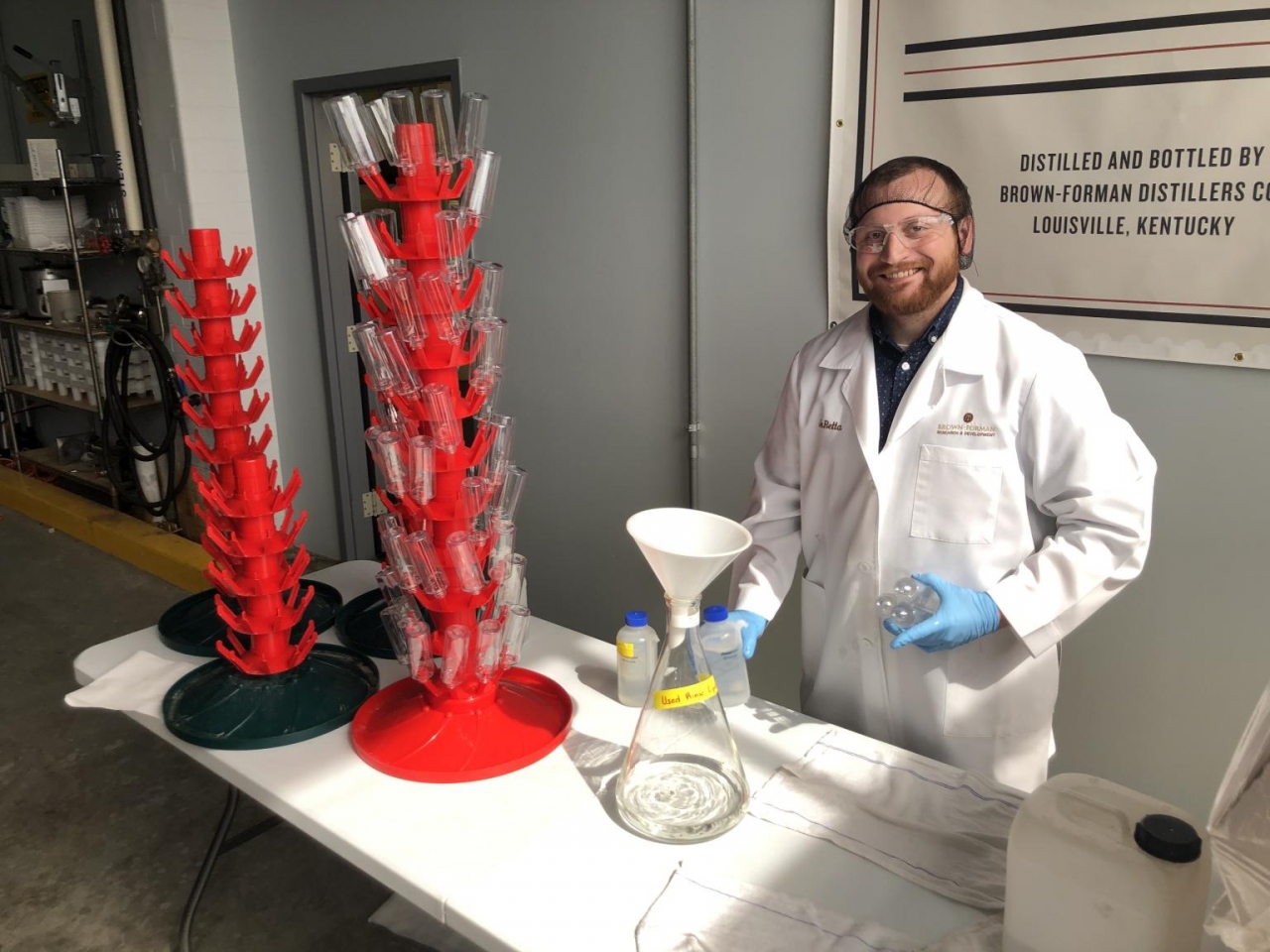
(Image: Brown-Forman's R&D department created their own hand sanitizer recipe and put it into production.)
Brown-Forman
The research and development team at spirits company Brown-Forman created their own hand sanitizer recipe and put it into production. The company's manufacturing workers will use it to help keep them safe, and the rest will be donated to first responders and healthcare workers in the communities surrounding its Jack Daniel's distillery in Louisville, Kentucky.
LVMH
In mid March, luxury goods conglomerate LVMH — which includes brands like Christian Dior and Givenchy — switched production lines from perfume and cosmetics to hand sanitizers. It sent the resulting product to French health authorities and hospitals, being one of the first major companies to do this.
L'Oréal
L'Oréal's North American manufacturing facilities are producing hand sanitizer for donation to U.S. employees, partners and healthcare professionals. It also sent surgical and N95 respirator masks from its operations facilities in North Little Rock, Arkansas, and Franklin, New Jersey, to local hospital systems in each surrounding community.

FedEx
FedEx used its air shipping network to transport more than 450,000 protective suits and 7 million face masks, along with other critical healthcare supplies, to the U.S. over the past two weeks. The logistics giant is looking to ship more than 500,000 suits per week over the next month in partnership with DuPont. Additional mask and supply shipments are also expected through another partnership with healthcare supplies company Medline Industries.
Fiat Chrysler Automobiles (FCA)
At the epicenter of the coronavirus in Europe, the Italian government asked medical equipment company Siare Engineering to triple its monthly production of ventilators to cope with hospital demand. With help from Ferrari and its parent company Exor, Fiat Chrysler is now making key ventilator parts at its plant in northern Italy to help Siare answer the call. The first round started coming off the lines on April 3.
FCA also said it expects to produce 1 million face masks a month for donation to first responders and workers treating COVID-19 patients in hospitals and healthcare clinics.
Image credits: Ford, FedEx via 3BL Media, Bacardi via 3BL Media, Brown-Forman via 3BL Media
Forced Out of the Friendly Skies, United Airlines Calls in to the Isolated
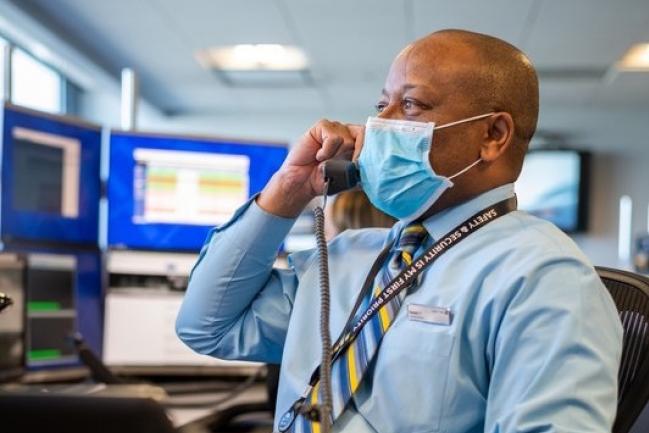
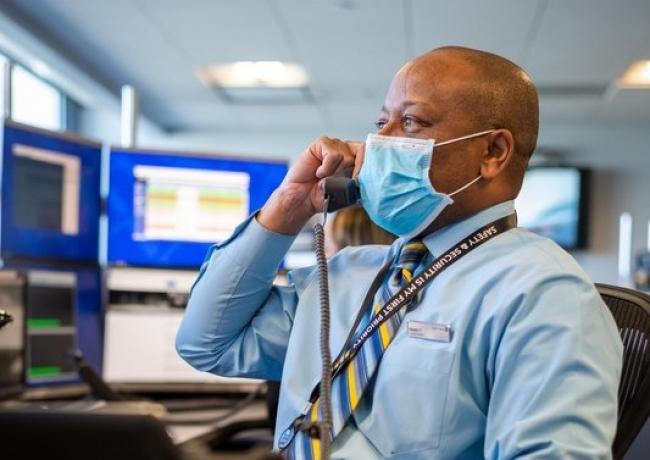
We’ve been saying time and again, for any company to show it is socially responsible, especially during a pandemic, one of the first things it can do is deploy the resources it has at hand for good. We’re seeing that now with United Airlines in Northern California.
The airline recently announced it would partner with the nonprofit Listos California, an advocacy group that works on disaster preparedness plans for vulnerable communities across the Golden State. As part of California’s Social Bridging Project, approximately 300 United Airlines employees in San Francisco, San Jose, and Los Angeles will make wellness calls to older California residents who already live alone and are now even more isolated due to the state’s shelter-in-place order.
The decision to have United’s employees involved makes absolute sense from a logistics point of view. These individuals are already well trained in customer service — and day after day during the best of times, call center employees have to deal with irate customers angry over delayed or canceled flights. While speaking to lonely and vulnerable citizens presents a different set of challenges, any experienced customer service representative should be able to take on such calls. Furthermore, while countless citizens want to volunteer their time but find it difficult to find such opportunities during this era of self-quarantining, United Airlines now has an opportunity to engage employees at a time when many have their own fears and worries.
According to Listos California, it was United that suggested this idea. “We are profoundly grateful to all of our compassionate employees who will be using their experience and training to bring some much-needed comfort to our state's most vulnerable residents during these difficult times," said Janet Lamkin, United Airlines’ regional president in California.
United’s previous relief efforts during this pandemic have included donating food and assisting with deliveries to food banks at its Houston hub. The airline has also arranged to fly medical volunteers to COVID-19 hotspots in New York, New Jersey and California. And at a maintenance hub in San Francisco, employees have pivoted to make hand sanitizer.
Other airlines have stepped up as well. JetBlue has said it will do what it can to help get much-needed personal protective equipment (PPE) to regions that need it. In the western U.S., the Alaska Airlines’ foundation has donated meals and pledged financial contributions to food banks to fight hunger. Yet United could provide other airlines ideas on how to leverage one of their greatest assets: their call centers.
Image credit: United Airlines/3BL Media
COVID-19 Makes the 2020s the Adaptation Decade for Climate Change


If one thing is increasingly clear from this COVID-19 era, it’s that countless millions of Americans – and even more global citizens elsewhere – will grow poorer from it. And this matters immensely for climate change.
Why? First, remember that climate action embodies two halves: mitigation of greenhouse gas emissions and adaptation to physical impacts. Poverty relates to each in very different ways.
Take climate change mitigation and how it relates to poverty. Mitigation actions include enhanced energy efficiency, especially in industrial, commercial and multifamily properties, utility-scale renewable energy and public transit investments. If done well and with intensity, all of these down the road will diminish climate change impacts on poor people and – and all people.
Of course, if you first want to explore how to decrease poverty while increasing climate change mitigation, you might focus on distributed energy generation in poorer neighborhoods; jobs for the poor in renewable energy; and public transit to employment, day care and school. Yet, as many investors will maintain, these initiatives may deliver less impact dollar for dollar on greenhouse gas reductions than would utility-scale renewables, transit infrastructure, and commercial and industrial energy efficiency.
Thus, the intersection of poverty reduction and greenhouse gas reduction may be less of a priority for the market.
COVID-19 exacerbates three huge climate change risks
So, pivoting to climate change adaptation – i.e., decreasing physical risk – how does it relate to poverty in America? Risk has three components: hazard, exposure and vulnerability. As for hazard, whether you’re poor or rich, each of us faces the same climate change peril. That is, the same scorching heat, sea level rise and wildfires.
As for exposure, those who live in harm’s way – along coasts or rivers or in the wildfire/urban interface – are more exposed to these hazards. To be sure, as a global recession strikes, there might theoretically be a decrease in climate change exposure, as demand declines for new housing along the flood-prone coasts and rivers or in wetlands and marshes. This also may stem the tide of older people continuing to move to the coast to live out their retirement dreams. Poverty has a way of quashing those aspirations.
The biggest intersection of physical climate change impact and poverty is vulnerability. That’s because the poorer you are, the higher your vulnerability – to most anything. When you lose your house or car in a flood or fire, you have fewer resources for alternate housing or transportation, when your asthma increases with extreme heat, you have less funds for medical care, when food prices go up due to drought, your purchasing power goes down. In the case of climate change risk, vulnerability separates the rich from the poor and illuminates the disproportionate impact of loss.
While the mitigation of greenhouse gas emissions has been a “nice to do” to involve the poor in job creation adaptation to climate change is a “must do.” We must focus on poverty alleviation and serving poorer neighborhoods as the priority of climate adaptation, or the result be even more profound suffering.
What must we do?
First, focus climate change adaptation on poor neighborhoods along the coasts and rivers’ edge, improving infrastructure and establishing the means and mechanisms for poor families to move out of harm’s way. And lest you think flooding is an issue for another time, consider that by 2050, U.S. coastal floods previously expected once every half century will occur almost every year in many areas.
Next, cool cities and neighborhoods to decrease deadly pockets of extreme heat (a.k.a. urban heat islands). Ensure that the poor have access to reliable air conditioning and the ability to pay electric bills. The urban heat island effect is predicted to increase heat by half. So, when temperatures rise 2 degrees Celsius (3.6F), city heat could rise 3 degrees Celcius (5.4F).
Finally, focus public health in poor neighborhoods to ensure that fewer people suffer from debilitating cardiopulmonary illnesses such as COPD and asthma, which become more dangerous as temperatures rise. Today under 10,000 Americans die from extreme heat each year. The federal Global Change Research Program estimates that the number of Americans who die annually from extreme heat will almost double by 2050 from the present number approaching 10,000. For high heat states like California, Florida and Louisiana, among other, climate change is expected to increase death rates by between 3.5-4%, particularly among the poor, by the end of the century.
The environmental and social impacts of COVID-19 will linger a long time
And while COVID-19 has tragically taken over 60,000 Americans’ lives, with startling percentages being lower-income Americans, estimates of future climate change deaths are also sobering. More poor Americans will die from rising temperatures and the increased frequency, intensity and duration of coastal storms. Around the world, unless climate change adaptation focuses on the poor, a tragic rise in deaths will occur from malnutrition, vector-borne disease, extreme heat exacerbating chronic illness, extreme weather-caused disruptions to health service and food supply, and deaths of despair as outdoor labor productivity plummets.
As poor Americans grow poorer in the post-COVID-19 era, this creates a priority to act on climate adaptation. If we choose to be agnostic about income levels in climate change adaptation in the same way we are in climate change mitigation, millions more Americans in the coming decade will not only be poor, they’ll be dead.
The post-coronavirus economic environment will demand extraordinary leadership from all sectors. In your climate action strategies, remember the poor.
Image credit: Victor He/Unsplash
This Pandemic Will See a Return of Consumers Going Local


Over the years, periods of economic hardship have drastically changed consumer spending habits. The Great Depression led to the rise of larger stores as consumers eschewed repeated visits to the butcher, the baker, the candlestick maker and everyone in between. The recession of the early 1990s was followed by the rise of big-box stores as consumers became far more cost conscious. And this pandemic will also witness another huge shift.
One result of this economic meltdown: With unemployment soaring over 20 percent and 26 million jobs lost, it’s not clear how our purchasing decisions will change in the long term. But a recent survey from EY gives us a clue about how many of us will spend our money once we emerge from this pandemic and the economic wreckage accompanying it.
The big takeaway from EY’s research is that over 40 percent of consumers surveyed across five markets expect their shopping habits to change drastically. About a third said they would be willing to pay more for local brands. Roughly a quarter said they will pay more to patronize brands they can “trust,” while a similar percentage said they'll open their wallets wider for “ethical” brands.
EY’s conclusion is that this pandemic is transforming how we live in ways that are “unthinkable,” but then again, if you’ve dared to look at your Facebook feed to see how your distant relatives and high-school classmates have responded to this chaos (as well as your real friends, of course), this shift isn’t really surprising.
Your aunt showed exasperation at the fact her credit card was charged for products she ordered online that may not come for weeks, if at all. A cousin three time zones away was dismayed that meatpacking plants have become COVID-19 hotspots as workers claimed they were kept in the dark and had no information. And that fellow you barely remember from high-school algebra class is ranting about yet another national restaurant chain that somehow finagled millions of dollars in the first round of the Paycheck Protection Program debacle.
Flippant examples aside, this EY study suggests what we here at TriplePundit have been reminding our readers during this pandemic all along: Long after we have a vaccine and can get closer to some semblance of normalcy, we will remember the brands that stepped up, as well as the brands that stepped in it. And as for business leaders who wanted to rush back to reopening the economy while countless people suffered? Any brands associated with them will struggle to devise a strategy that doesn’t come across as some form of duck and cover.
I believe much of this shift will be driven by psychology more than any marketing messaging: For those of us taking social distancing seriously and have experienced the world only through our laptops and packages delivered to our doors, we will be quick to indulge in that feeling of community again. We’ll spend money at local restaurants and small shops out of gratitude as they went above and beyond the call of duty during this crisis. And we’ll shun the brands that, fair or not, bear any ties to what currently seems like a dystopian nightmare with no end in sight.
From the Brands Taking Stands newsletter. Be sure to subscribe!
Image credit: Logan Weaver/Unsplash
Under COVID-19, Worker Safety Issues Leap Beyond Factory Gates


Worker safety in the U.S. was suffering from a slowdown in enforcement before the COVID-19 outbreak, and now it is cracking under the strain. In the latest development, the meatpacking industry has become a hotspot of infection, leading to plant closures and a ripple effect on livestock farmers and the nation’s food supply.
Meatpackers at high risk from COVID-19
Ominous signs in the meatpacking industry bubbled up earlier this month, when COVID-19 outbreaks began to emerge among workers. By April 22, infections had broken out in dozens of plants across the country.
The problem is partly related to the particular work environment in the meatpacking industry. Unlike other factories and food production facilities, meatpacking plants are not dominated by robots and automated machines. Human hands do much of the work, and employees are placed in close proximity along assembly lines.
In terms of COVID-19 transmission, the proximity factor can be exacerbated by long shifts of up to 10 or even 12 hours.
Another factor is the industry’s longstanding reputation for unsafe conditions, including the use of hazardous chemicals. In 2005, a report by Human Rights Watch (HRW) noted that “the increasing volume and speed of production coupled with close quarters, poor training and insufficient safeguards” contribute to poor health among meatpacking workers, potentially putting them at higher risk for COVID-19 impacts.
As recently as September 2019, HRW drew attention to conditions in the meatpacking industry, stating that “these workers have some of the highest rates of occupational injury and illness in the United States.”
Further complicating the situation is the location of major meatpacking operations in states that have failed to respond aggressively to the outbreak.
For example, one of the first major COVID-19 hotspots to emerge was at a Smithfield pork processing plant in South Dakota. The state has yet to issue any stay-at-home orders, even though the plant was closed earlier this month after almost 450 workers were infected. Similar circumstances leading to closures have occurred at plants that Tyson Foods and JBS operate.
The result has been a perfect storm of disease transmission. Meatpacking workers are at constant risk of exposure to COVID-19 both inside the factory and in their communities as well — and in turn, these workers can also become vectors in communities that are not strictly observing social distance precautions.
Reporters Dianne Gallagher and Pamela Kirkland of CNN took a deep dive into the issue on April 27 and noted that at least 13 processing plants have closed in recent weeks, reducing the nation’s pork and beef slaughter capacity by 25 percent and 10 percent, respectively. The poultry industry has also been hit hard by this pandemic.
Gallagher and Kirkland also concluded that the problem will likely become cyclical as factories reopen without adequate testing and protection, only to experience another outbreak.
Pleading for leadership on COVID-19
Last weekend the Occupational Safety and Health Administration and the Centers for Disease Control finally issued “interim” COVID-19 guidance for the meatpacking industry and its workers.
In a press release dated April 26, the two agencies explained that “close contact with coworkers and supervisors may contribute” to worker exposure.
However, the OSHA-CDC guidance relies partly on social distancing in the workplace, which is ineffective unless meatpacking plants are modified to accommodate far fewer workers.
In addition, the guidance also relies on screening and protective equipment, two areas in which a lackluster federal response caught the nation as a whole almost completely unprepared to respond effectively. Until an efficient system of testing and contact tracing is established, meatpacking plants are at greater risk of infection.
Coincidentally or not, over the weekend Tyson also issued a public statement. It placed a full page advertisement in the New York Times and other leading publications, warning that the nation’s food supply chain is vulnerable and is, in fact, breaking.
Though Tyson did not go so far as to claim that the nation will actually run out of meat, the company did state that "there will be limited supply of our products available in grocery stores until we are able to reopen our facilities that are currently closed.”
More to the point, Tyson pleaded for national unity on COVID-19 response.
“The government bodies at the national, state, county and city levels must unite in a comprehensive, thoughtful and productive way to allow our team members to work in safety without fear, panic or worry,” the company stated.
“The private and public sectors must come together. As a country, this is our time to show the world what we can do when working together,” Tyson added.
Where is the leadership?
That’s quite an ask, considering that the President has been working diligently in the opposite direction. In addition to failing to prepare a national healthcare and prevention plan in advance of the outbreak, failing to organize a medical supply chain, and ignoring the guidance of epidemiologists and public health professionals, he has also feuded with governors over stay-at-home orders, encouraged protestors to violate stay-at-home orders, and forced states to compete against each other — and the federal government — for scarce supplies.
As for the public and private sectors working together, the president failed to exercise his authority under the Defense Production Act in a timely manner before the outbreak took hold, forcing CEOs like GM’s Mary Barra to plot their own course.
In this context, it’s worth nothing that Tyson did adopt a number of COVID-19 response measures long before OSHA and CDC issued any public guidance.
The company began its efforts as early as January, with the establishment of a COVID-19 task force. It continued to step up its efforts in the following months. The outbreaks occurred regardless, at Tyson and elsewhere in the meatpacking industry.
As Tyson itself makes the case, clearly individual corporations are no substitute for a coordinated federal response that engages the public at every level in a common cause.
Nevertheless, the President’s response to the meat situation has been, well, predictable.
After failing to take action earlier this month, yesterday evening the President was reportedly expected to sign an executive order compelling meatpacking plants to remain in operation, while absolving them of liability for workers who contract COVID-19.
The President reportedly worked with Tyson on the order. If that is so, it will be interesting to see if the order is consistent with the company’s public statement of just a few days ago.
“We’ve remained true to our core values, especially by continuing our focus on providing a safe work environment for our team members,” Tyson’s statement concluded.
Corporations plan, but COVID-19 decides
Liability or not, it is unclear if any meatpacking plants will be able to function consistently in regions where members of the public fail to practice social distancing, putting workers at risk for new waves of infection in their communities.
Worker ranks may also be thinned in consideration of employees who have underlying medical conditions or other risk factors, or those who live in households with at-risk residents.
Until the President puts COVID-19 response in the hands of experienced professionals, Tyson and other companies — and their workers — will face an uncertain future.
Image credit: Pexels
In Crisis, the U.S. Food Supply Could Use a Lift from the Business Community


By now, we have all seen the photos showing how food banks across the U.S. are overwhelmed as the novel coronavirus continues to spread. Meanwhile, countless businesses have shut down and could disappear for good, except for groceries and pharmacies, many of which are preoccupied with their own struggles. As more citizens lose their jobs and families are threatened by food insecurity, the problem isn’t a lack of food: vegetables keep growing and cows still need to be milked. But the U.S. food supply is in disarray and families are going hungry because farmers and food distribution companies can’t change course fast enough – and the amount of capital required to launch such a shift imposes its own threat of financial run.
Fresh food is destroyed as families confront hunger
“The widespread destruction of fresh food — at a time when many Americans are hurting financially and millions are suddenly out of work — is an especially dystopian turn of events, even by the standards of a global pandemic,” wrote David Yaffe-Bellany and Michael Corkery earlier this month for the New York Times. “It reflects the profound economic uncertainty wrought by the virus and how difficult it has been for huge sectors of the economy, like agriculture, to adjust to such a sudden change in how they must operate.”
One would assume volunteers could band together, mobilize and gather that food and then distribute it to families in need. But it’s not that simple: About half of the produce U.S. farmers grow is for restaurants, which are either closed or only doing a sliver of business with takeout or delivery orders. As one spouse of a Fresno County farmworker told the Sacramento-based news site Cal Matters, “but who is going to pick it?” For most farmers and dairies, the alternative is to dump excess milk or plow those unwanted vegetables back into the soil. The economic collapse due to the massive disruption throughout the U.S. food supply is a painful gut punch: losses for farmers could approach close to $700 million between March and May of this year.
The more grisly stories come from the meat and egg industries, where producers have smashed eggs so they won’t become chickens or euthanize pigs as some of the largest meatpacking producers in the U.S. close down due to COVID-19 outbreaks.
Local efforts desperately try to keep the U.S. food supply afloat
Granted, heroic efforts are accelerating nationwide as nonprofits, food banks and volunteers work with farmers to do their best so they can help food banks keep up with demand, action we can see from Houston to Wyoming to upstate New York. Meanwhile, more small farmers are pivoting to stay afloat, whether they launch community-supported agriculture (CSA) schemes on the fly or they transform former roadside produce stands into drive-thru businesses. One egg ranch outside of the Central California town of Clovis saw the number of customers surge from 80 to 500 a day.

Photo: A volunteer sorts vegetables at a Feeding America-affiliated food bank in Hawaii (Feeding America/Facebook)
To their credit, players in the sports and entertainment industry, one sector that has screeched to a halt during this crisis, has seen plenty of leaders step up. The efforts range from football’s Pittsburgh Steelers football franchise supporting local efforts to distribute boxes of food to families in need, to the NBA San Antonio Spurs’ CEO offering his assistance to a massive local food bank operation. The entertainment community is chipping in as well. On the business side, companies as starkly different as Beyond Meat and Hormel are donating what they can as well.
But no matter how noble, sincere and tireless these individual efforts are, the reality is that each of these maneuvers are akin to wielding small butter knives trying to fight back against what is in comparison is an AK-47 assault on the U.S. food supply.
As the federal government flails, a grocer takes command
To that end, many farmers and some members of Congress want the federal government to step in and buy agricultural products that would otherwise go to waste – an effort these advocates say would help keep these vital cogs in the U.S. food supply chain solvent while allowing this food to go to where it’s needed most. Such a move makes sense: after all, the federal government has a presence everywhere, including rural areas, and could theoretically even deploy the military to manage the logistics of such an operation. Based on the federal government’s constant dithering in the midst of this crisis, however, such a 180-degree turn is unlikely.
One company showing how to gather food industry stakeholders in order to get things done is the grocery chain Publix. The Florida-based retailer announced last week an initiative that would buy dairy products and fresh produce from farmers, and then turn around and donate them to Feeding America member food banks across the southeastern U.S. The company can certainly point to its legacy as it puts its credibility behind this plan – since 2009, Publix said it has donated $2 billion in food to citizens and need and plans to double that amount over the upcoming decade. This is a program other retailers may want to emulate – and it sends a signal to the feds that it’s time to get their act together.
Image credit: Pixabay
Lessons to Learn From: CEOs Explain How They're Responding to COVID-19
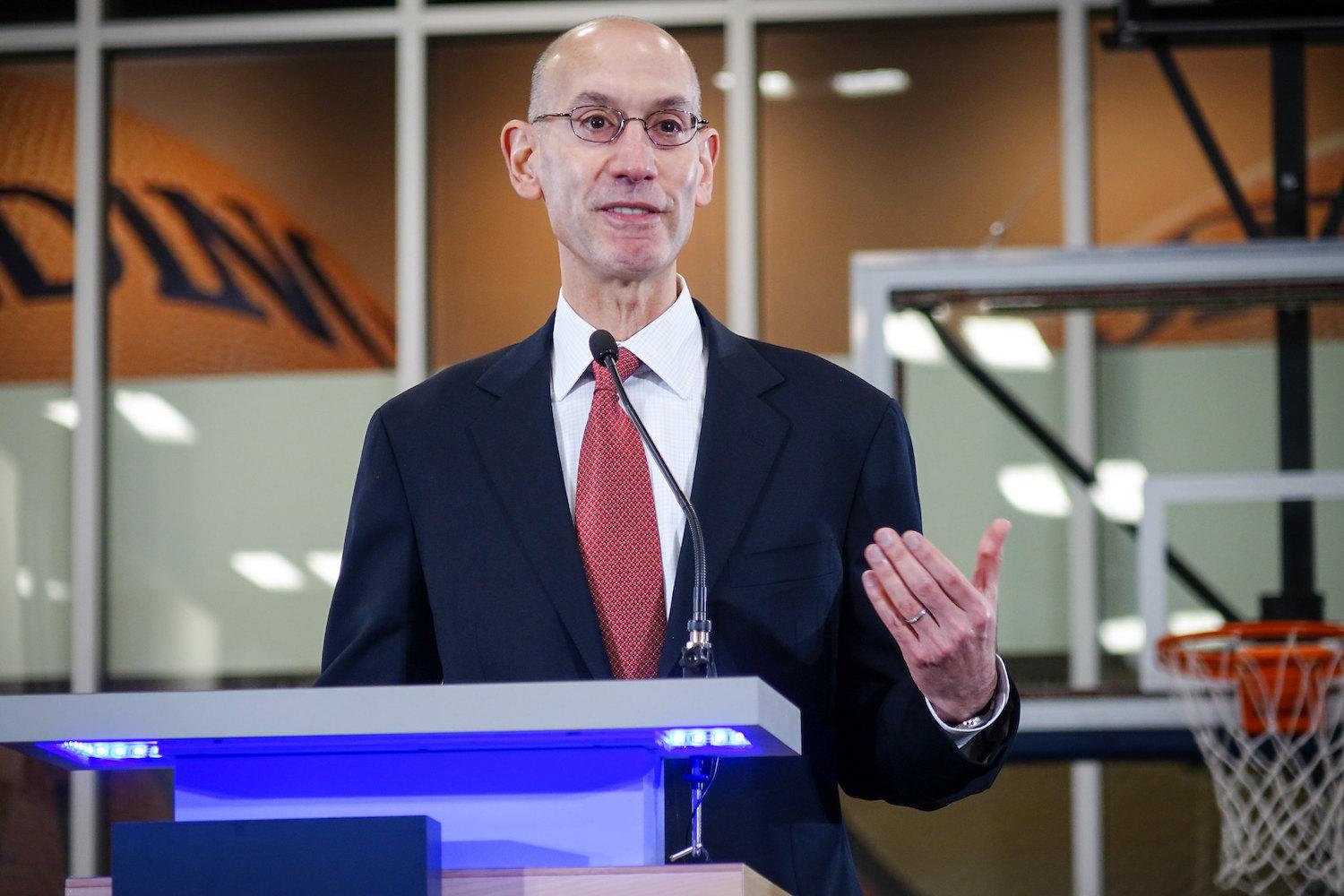
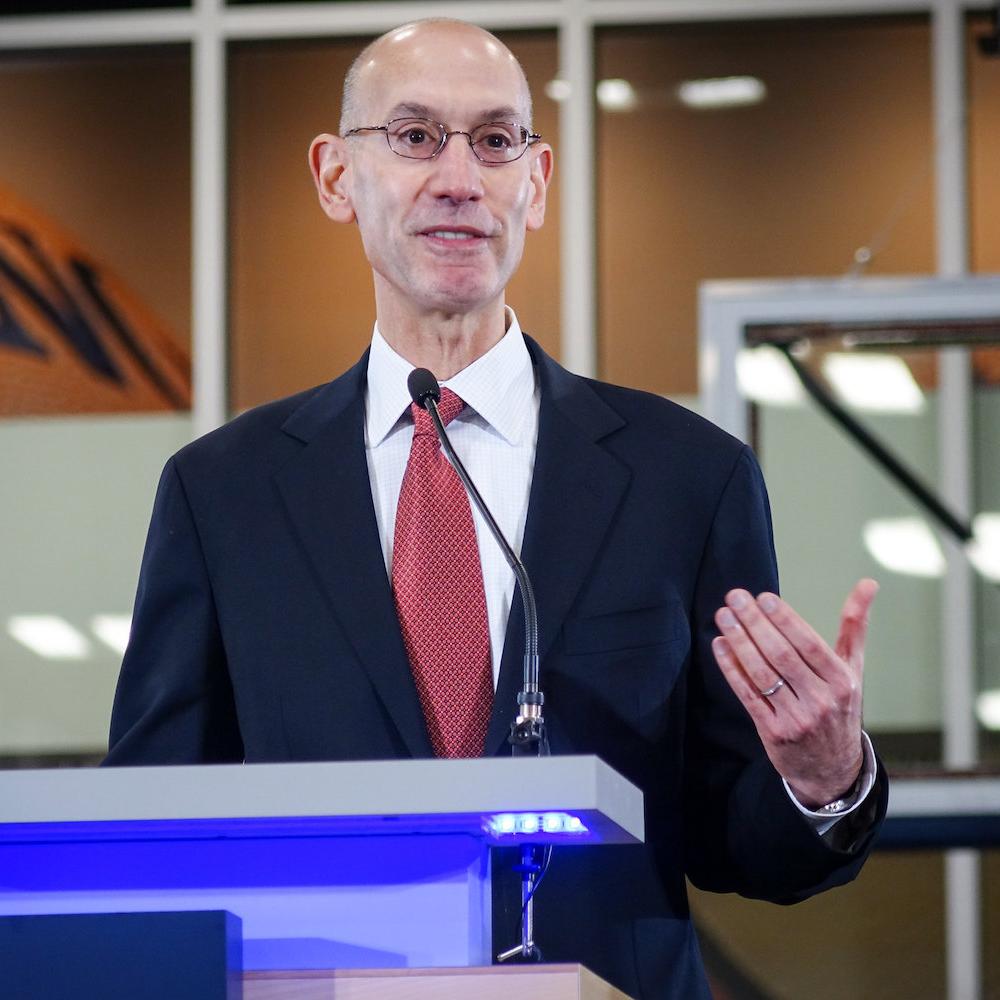
In times of crisis, people look to leaders for reassurance. And while some CEOs have stayed silent, continuing to collect seven-figure salaries and mind their bottom lines even as their employees face layoffs or feel unsafe coming to work, we've seen truly inspirational leadership from purpose-driven executives across the U.S. These CEOs are leading with vulnerability and authenticity, being straightforward about what they know and what they don't, and putting people and communities before profit.
If you need some help restoring your faith in humanity, read on for a dozen standouts that crossed our desks over the past month.
Adam Silver, NBA Commissioner
Commissioner Adam Silver (pictured above) moved to suspend the 2020 NBA season within minutes of the first player testing positive for the new coronavirus, at a cost of more than a billion dollars. Since then, at least 15 others in the league have tested positive, indicating Silver's early action prevented the virus from spreading even further among players, staff and fans. He spoke with humility about the decision in a March interview with CBS Sports.
"The decision then, in retrospect, most would argue events made it for me, but it seemed in that moment the right thing to do was to suspend the operation of the season," Silver said.
When asked whether he believed the season could continue this year, he replied: "We're gonna try by every means we can to play basketball again, but the safety and health of our players and fans is first, so I don't want to speculate more than that. That will be the condition of how much we can play — when public health officials give us the okay."
Mark Cuban, owner of the Dallas Mavericks
Days after Silver announced the suspension of the NBA season, business mogul and Dallas Mavericks owner Mark Cuban said he would continue to pay all stadium employees indefinitely. Cuban, who has been a leading voice for a science-based, people-first business response to the pandemic, offered a refreshing perspective on his decision in an April interview with WBUR, Boston's NPR News Station.
"The CEO is of no more importance than somebody cleaning the floors," Cuban said. "I think that this is a time as a reset where we really have to reevaluate how we treat workers, how people are paid, how can we get them into a role where they receive an equity as part of their compensation, so that they're not having to live paycheck to paycheck, they have something that appreciates. All these things I think are important as we go through this reset in business.
"How you treat your employees today will have more impact on your brand in future years than any amount of advertising, any amount of anything you literally could do," he continued. "Because, again, we're all suffering from this. Every single person is looking to see how their company is treating them, how their employers are treating family members and friends."
Jo Ann Jenkins, CEO of AARP
Senior citizens are at far higher risk of developing serious complications from COVID-19, the disease caused by the new coronavirus. As the most powerful U.S. advocacy group for seniors, AARP responded right away — providing locally-based coronavirus resources for older Americans, helping them guard against fraudsters targeting their stimulus payments, and advocating for reform in nursing homes, many of which have been reportedly lax in their communication to worried loved ones during the crisis.
CEO Jo Ann Jenkins, who Black Enterprise named as one of its most powerful women in corporate America, elaborated on that last point in an open letter.
"The lack of transparency from the nation's nursing homes is nothing short of outrageous," Jenkins wrote. "We all know that COVID-19 is especially dangerous for older people, particularly those with underlying conditions. Those living in close quarters are even more susceptible. But there's no reason nursing home residents should be made more vulnerable because they and their loved ones weren't kept informed or provided an easy way to stay in touch."
Chuck Robbins, CEO of Cisco
As we profiled on 3p this week, Cisco moved quickly to deploy its people and resources across three critical areas of need: education, healthcare and humanitarian aid. As of last month, the more than $200 million it committed was the second largest donation worldwide in response to COVID-19. While speaking with Bloomberg about how the coronavirus is affecting Cisco's business, CEO Chuck Robbins kept bringing the conversation back to the impact on others, particularly the most vulnerable.
"The big thing we are really worried about — beyond our customers, beyond our employees — are our communities," Robbins said. "We see what is happening with our homeless communities, with what is happening when we are one financial crisis away from being on the streets. This is what we have to focus on right now."
Kevin Johnson, CEO of Starbucks
In late January, Starbucks shuttered 80 percent of its stores in China to help slow the spread of the new coronavirus. The lessons it learned armed the company for a swift and decisive response in the U.S.
In mid-March, as state and local governments began implementing stay-at-home orders, Starbucks announced it would continue to pay employees for 30 days — whether they worked or not. Employees whose stores remained open for drive-thru and delivery and who felt comfortable coming to work received a $3 per hour raise. CEO Kevin Johnson detailed the mindset behind the decision in an appearance on CNBC’s "Squawk on the Street" on March 24:
"I believe it's the responsibility of every business leader to care for the employees during this time of uncertainty, shared sacrifice and common cause," he told CNBC's Jim Cramer. "Not every decision is a financial one. This is a time to prioritize people over profit."
Beth Ford, CEO of Land O’ Lakes
As demand for grocery staples surges across the U.S., employees at food processing facilities such as those operated by Land O' Lakes are considered essential workers. Beth Ford, who took the helm of the farmer-owned cooperative in 2018, says she continues to focus on the health and wellbeing of employees — including through increased wages, added benefits like extended sick and childcare leave, and enhanced safety measures that ensure social distancing.
“Where you learn a lot is if you listen to your employees,” Ford told Twin Cities Business, which reports on business news in the company's home state of Minnesota. “What are their concerns? Then you try to mitigate those concerns. That, I think, is the most important thing for us.”
David Cordani, CEO of Cigna
Cigna was the first insurer to commit to covering all costs related to coronavirus testing and treatment — including hospitalizations, future medications and future vaccines — both in and out of network. It was later joined by Humana. CEO David Cordani elaborated further in a March 30 appearance on "Squawk on the Street."
"In a time of crisis, which is what we confront right now, we're telling ourselves to step forward and help our customers, help our patients, and provide them peace of mind," Cordani said. "We're stepping in to help customers, and in this case as we step back and see individuals fighting the health challenge, we wanted to take the financial burden off their docket."
Lisa Su, CEO of Advanced Micro Devices (AMD)
In March, AMD transitioned all 10,000 of its employees to remote work, managing to execute sophisticated engineering tasks from a distance. Employees who cannot work due to health or family challenges continue to receive full pay. The company also stepped up to donate $15 million worth of high-performance computing systems to research institutions working on treatments and vaccines. Lisa Su, one of very few women of color to lead an S&P 500 company, confirmed her commitment to action in a recent interview with CRN Magazine.
"AMD remains focused on providing strong and unwavering support to our employees, customers and the communities around the world we call home," Su said. "We look forward to continued partnership and shared resilience as we persevere and become a stronger global community."
Satya Nadella, CEO of Microsoft
This pandemic hits especially close to home for Microsoft CEO Satya Nadella. His 23-year-old son, Zain, has cerebral palsy, which weakens his immune system and puts him at increased risk for serious complications if he were to contract the new coronavirus. As he helps one of the world's largest technology companies navigate disruptions caused by the pandemic, Nadella's son is always on his mind, he told the Seattle Times. And he got real in a lengthy email sent to employees in March, as reported by the Times.
“We are in uncharted territory,” Nadella wrote. “Much is unknown, and I know how unsettling and uncertain this feels. Like many of you, there have been times over the past weeks where it has felt overwhelming and all-encompassing for me. I worry about the health and safety of my family, my co-workers and friends. My wife and I worry for her aging parents, who are far away from us in India."
“One truth that brings me comfort is, just as this virus has no borders, its cure will have no borders,” he continued. “We are all in this together as a global community. For me, the best way I’ve found to get past this anxiety is to focus on what I can do each day to make a small difference. Each of us, wherever we are, has the opportunity to do the same — take an action driven by hope, a small step that makes things a bit better. And if everyone does something that makes the world a bit better, our collective work will in fact make the world a lot better, for the people we love, for our communities, for society.”
Claudio Del Vecchio, CEO of Brooks Brothers
On March 30, Brooks Brothers announced it would transition its three U.S. factories from producing shirts and ties to surgical masks and medical gowns for frontline healthcare workers. CEO Claudio Del Vecchio explained the move on "Squawk on the Street" a day later.
"Our priority is the health and safety of our people and our customers," Del Vecchio said. "We are celebrating our 202nd birthday, and through many of those years we had to go through a lot of challenges. We had a couple of world wars and the [Great] Depression, and we came out of all of those things pretty well, thanks to the support of our customers. That's why we wanted to go out and support our customers and the communities who have supported us for so many years."
Omar Ishrak, CEO of Medtronic
Among other things, medical device company Medtronic produces ventilators — which are needed for patients who are seriously ill with COVID-19. Medtronic is working with other companies to increase its production of ventilators by 40 percent, and it open-sourced the design schematics for one of its ventilator models so it can be produced by any company in order to meet demand. CEO Omar Ishrak offered a message of solidarity and reassurance in an open letter to customers and patients.
"The world is facing an unprecedented human challenge with COVID-19, and this virus requires an unprecedented response," he wrote. "We will never compromise our integrity and, like we have done for seven decades, we will put the patient’s needs at the forefront of our decision-making. We will not raise prices or pit one customer against another in a bidding process for these critical products.... We know this virus can and will be defeated, and we will do our utmost to make that a reality."
Tim Cook, CEO of Apple
Apple closed its 42 stores in China in January in response to the coronavirus. In mid-March, it did the same in the U.S., shuttering stores from coast to coast in an attempt to slow the spread. The company continues to pay retail employees as if stores were open. And, after initially leaving contract workers like janitors and shuttle bus drivers out of its compensation plans, the company pivoted and said they, too, would continue to receive full pay during the shutdowns. CEO Tim Cook explained further in a company statement.
"This global effort — to protect the most vulnerable, to study this virus, and to care for the sick — requires all of our care, and all of our participation," he wrote. "We do not yet know with certainty when the greatest risk will be behind us. And yet I have been inspired by the humanity and determination I have seen from all corners of our global community. As President Lincoln said in a time of great adversity: 'The occasion is piled high with difficulty, and we must rise with the occasion. As our case is new, so we must think anew, and act anew.'”
Image credit: Mayo Clinic/Flickr
Furloughed SAS Cabin Crew Retrained as Frontline Healthcare Workers


Furloughed SAS – Scandinavian Airlines cabin crew are volunteering to receive additional training to support front-line workers fighting the COVID-19 pandemic in Sweden.
In an ideal match of skills to crisis, SAS (Scandinavian Airlines) has offered its temporarily laid off cabin crew the chance to volunteer to support front-line medical workers in the fight against COVID-19. The move has been wildly popular among SAS employees as other airlines have followed suit. As many businesses ponder how to support relief efforts, airline crews, with their safety and emergency training, can make a unique contribution.
In mid-March, SAS, partly owned by the governments of Sweden and Denmark, laid off 10,000 staff - 90 percent of its workforce - to cut costs as air travel screeched to a halt. SAS recognized that its furloughed crew could be easily trained to help on the front lines of the pandemic, according to Karin Nyman, Vice President Brand & Communications at SAS. So, the airline offered employees the chance to take a three-day course in basic hospital duties to help fill the gaps in a strained Swedish healthcare system.
Hundreds of employees eager to retrain
The response was overwhelming, with some 500 employees applying for different types of jobs as part of the program. While it started in Sweden, employees in Denmark and Norway have also been offered a chance to join. “When we were about to do these temporary lay-offs, we contacted healthcare and elderly care organizations and asked if they would need some help. We got a very positive response. We were able to quickly set up training that was suited for our cabin crew who already receive as part of their job training an introductory course in caregiving and other skills that are needed in a crisis situation,” Nyman told TriplePundit.
Sweden, with a population of 10.2 million people, has so far had 18,926 confirmed COVID-19 cases, and 2,274 deaths from the virus. With its lack of strict lockdowns, Sweden has taken a decidedly different, and controversial approach to its neighbors; the virus has been nearly 10 times as deadly in Sweden as in other Nordic countries.
“What has been really good to see in this is that there is a big attraction for SAS employees because people recognize that they have a very high level of service and are trained for a special crisis moment such as this,” she continued. “We’ve gotten feedback from several companies we have been supporting that our employees’ support has been very helpful. For us, it is amazing to see how quickly our employees transform and are able to use their skills in the health sector.”
According to Nyman, SAS is now receiving requests for their employees to pitch in to help in the pharmacy and logistics sectors, as well assisting at schools and with first responders like ambulance crews. “While we hope to be up in the air very soon, we are trying to be a facilitator between our employees and different organizations in society that have a big need in these difficult times.”
Other airlines take the same route as SAS
The fast-track healthcare course offered by Sweden’s Sophiahemmet University is mainly delivered online to comply with social distancing rules. The curriculum focuses on providing basis like theoretical knowledge about infectious diseases, patient confidentiality, hygiene and nursing methods, how to deliver information to patients and relatives and carry out administrative tasks. The course is free of charge and the companies involved with the training are not seeking to make a profit. Funding, about 7 million Swedish crowns ($698,000) is provided by the Marianne and Marcus Wallenberg Foundation.
Nyman said SAS has been contacted by other airlines about the program “and we’re happy to share about how we’ve set it up,” she added. In the United Kingdom, some flight attendants for EasyJet and Virgin Atlantic have volunteered to help out at the new National Health Service (NHS) hospitals being set up specifically for coronavirus patients. Singapore Airlines, which suspended virtually all of its flights until May 2020, has asked its flight attendants to assist in hospitals during this period as well. Similar initiatives to lend a hand are being explored in the U.S. as well, as Julie Hedrick, the national president of the Association of Professional Flight Attendants, told NPR recently.
Untapped skills linger among the unemployed
But why stop with flight attendants with such a dire need for support on the front lines of the pandemic? Raj Panjabi, CEO of the NGO Last Mile Health, which brings primary care services to people living in remote communities, sees a potential army in the millions of Americans unemployed by the pandemic.
“What if Americans who are unemployed by the pandemic could be hired to fight it?” he recently wrote in an op-ed for the World Economic Forum. “Around the world, local residents without a medical or nursing degree have been rapidly trained, hired, and equipped to respond to other epidemics that have spiraled out of control…We could rapidly expand our healthcare teams by investing in the people closest to the problem – hiring and training the millions of people put out of work by the epidemic.”
Panjabi suggests that the U.S. Centers for Disease Control and Prevention (CDC) and state health departments can work with universities to develop rapid online programs to train the millions of Americans currently out of work in their own homes. Last Mile Health has since launched similar online and mobile training programs globally.
As U.S. companies grapple with historic unemployment and the quickly fading prospect of returning to business-as-usual, it might be time to see the American workforce—and their untapped skills—in a new light.
Image credit: SAS
U.S. States Step in to Save Green Jobs for COVID-19 Recovery


The U.S. wind and solar power industries have emerged as key job creators in recent years, and both industries are scrambling to shield their workers from the economic havoc wreaked by the COVID-19 crisis. Unfortunately, federal policymakers have not prioritized green jobs, at least not yet. Nevertheless, several states have stepped in to take action that could help reduce the impact and position renewable energy for rapid recovery.
Green jobs are more than clean jobs
The COVID-19 crisis has added a new level of life-or-death urgency to the global decarbonization effort. Evidence is mounting that groups disproportionately impacted by pollution — specifically, low income communities and communities of color — are at higher risk of death from the novel coronavirus. And, they are more likely to be co-located with sources of pollution including power plants, refineries, landfills and highways.
The hard evidence is incomplete, but so far the available data shows that African-Americans, Latinos, and Native Americans face a significantly higher risk of death than Caucasians from COVID-19 in the U.S.
Researchers at Harvard University have also linked exposure to pollution with a higher risk of death from COVID-19, and Scientific American cites other studies noting significant racial and economic disparities linked to increased exposure to environmental hazards.
Green jobs for healthy communities
The Natural Resources Defense Council has called attention to the need to support clean technology workers during the crisis, and take steps to rebuild the nation’s roster of green jobs as quickly as possible.
On a state-by-state basis, some of those steps are already under way.
Renewables-friendly Massachusetts, for example, was already acting to increase green job opportunities before the COVID-19 crisis hit in force, partly with job-creating grants to local governments through its existing “Green Communities” program.
On April 15, as the outbreak took a grip across the nation, the state doubled the capacity of its solar incentive program to a total of 3,200 megawatts. The update also provides more leeway for projects in low-income communities.
Another example is New York State, which has paused all non-essential clean energy work under the state’s COVID-19 shutdown, but has extended the completion deadline for projects under its NY-Sun solar affordability program.
Interestingly, the U.S. Department of Energy is also working to support green jobs during the crisis. Last fall the agency redesigned and restarted an Obama-era program aimed at establishing access to community solar power for every household by 2025. The program is currently moving forward with an informational webinar scheduled for today.
Green jobs to support displaced workers
So far, the full impact of green job losses has struck mainly at the smaller end of the clean technology scale, as property owners cancel or stall rooftop solar, weatherization and other energy improvements on buildings. Those jobs may be expected to return as stay-at-home orders are lifted and the economy recovers.
In contrast, job losses in the fossil fuel sector may be permanent. Large scale wind and solar projects in the U.S. are expected to continue without significant delays, adding more clean power to the grid and squeezing coal and gas aside.
The potential for greening the energy workforce was outlined by Bloomberg columnist Liam Denning on March 20. The U.S. coal industry was already on the ropes years before the COVID-19 outbreak, and Denning notes that the oil and gas industry also began losing “easy access” to capital before the virus struck.
He foresees that a recovery in the oil and gas sector will involve trimming payrolls down to the bone. Moreover, many jobs will be concentrated geographically, where extraction activities take place.
In contrast, Denning makes the case for the Green New Deal model, in which construction jobs related to electrification, energy efficiency and renewable energy are distributed all across the country.
“In broad terms, one side of the energy industry busies itself primarily with digging stuff out of the ground while the other concerns itself more with planting stuff in the ground,” he explains. “If one result of COVID-19 is that America finally gets around to infrastructure week, then the latter should enjoy a working advantage.”
Denning cites utilities as natural allies in the push for green jobs. Replacing fossil fuels with clean electricity in buildings and cars is a plus for the power generation business.
There are other key partners as well, in the form of corporate support for clean power. Business sector interest in renewable energy predates the COVID-19 outbreak and has accelerated in recent years. If anything, the outbreak has demonstrated that ESG investing — including clean power — is a powerful bottom line tool for weathering a crisis as well as growing a sustainable business.
U.S. Senate Majority Leader Mitch McConnell (R-KY) controls the flow of federal legislation, so the prospects for a federal green jobs program are still months away at best. In the meantime, business leaders can work with state-level officials to help displaced workers financially while they sustain the decarbonization trend as the nation picks up the pieces after COVID-19.
Image credit: Unsplash
Leadership at Cisco Rides on Technology and Partnerships
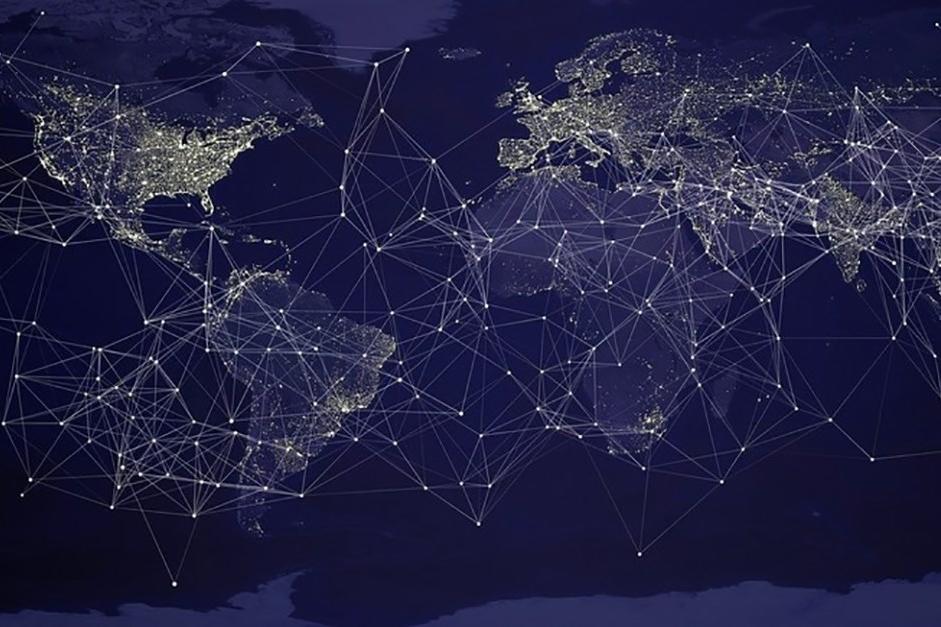
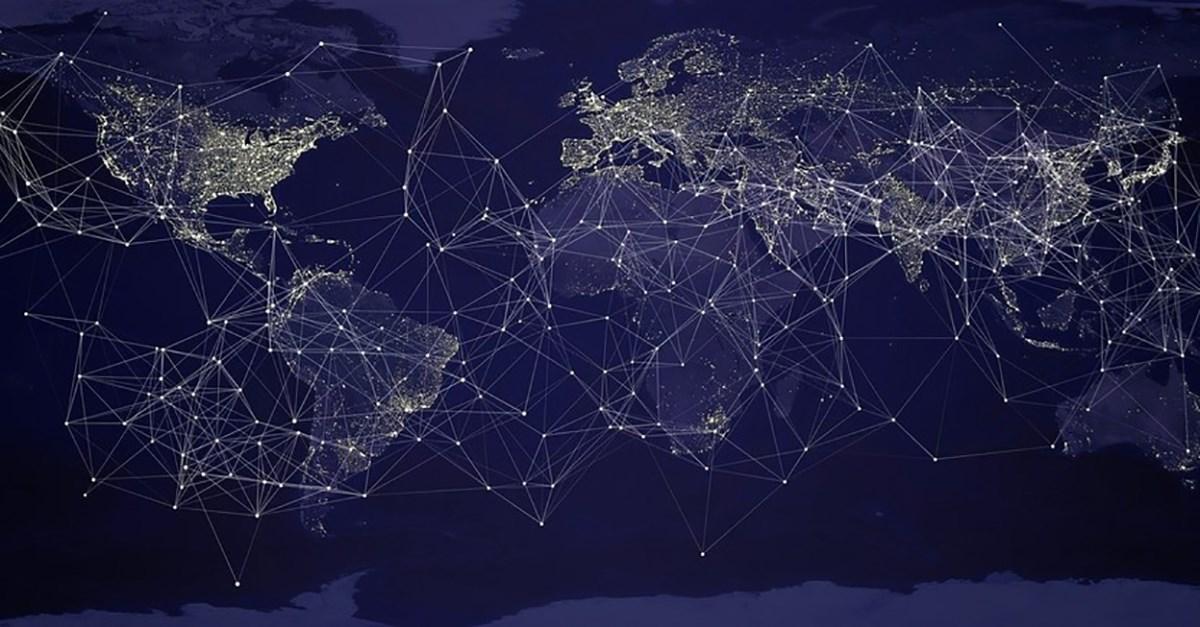
During any time of crisis, companies can best respond with this effective one-two punch: First, leverage their core competencies for good; and second, harness the power of partnerships, in any form, that they already have forged with other organizations. Cisco Systems offers a template for how other businesses in any sector can direct their resources to offer society a lift during this ongoing pandemic.
Over the past several weeks, Cisco has deployed its people and resources across three critical areas of need: education, healthcare and humanitarian aid.
Well-positioned to assist with remote learning, Cisco has delivered
The vast array of partnerships that Cisco has been able to develop over the years has positioned the company well when it came time to help students and teachers as they quickly adjusted from classroom to remote learning. One example of how Cisco’s philanthropic efforts have paid off is seen in the work of MIND Research Institute, a California-based nonprofit that develops software games to help schoolchildren grasp mathematical concepts. One of MIND Research’s applications, ST Math, includes over 35,000 games and puzzles, which the organization in turn says has helped boost students’ math scores across 13 U.S. states.
Cisco’s financial support has also helped MIND Research deploy a new platform just in time for this new reality of students having to learn from home. Further, the use of Cisco’s technology is also integral for the nonprofit's operations. According to MIND Research’s CEO, Brett Woudenberg, the nonprofit’s technology team is currently integrating the ST Math program within the Cisco Webex platform. In turn, parents who have seen their children benefit from this program have been moved to donate funds so that other students can benefit. “We’ve had tons of families pay it forward and provided donations as a way of saying thanks, which has been fantastic,” Woudenberg said during an interview with Cisco’s Stacey Faucett last week.
Another nonprofit that has received a Cisco grant, TalkingPoints, has helped support families with homeschooling through translation made possible by artificial intelligence. TalkingPoints’ technology allows teachers to send a message to their students’ parents, which the program can translate into approximately 100 languages. Family members can respond to the teachers in their native language, which the teacher can then read in English. “Even when parents don’t have internet or computers, parents can usually connect with teachers through mobile phones,” said Heejae Lim, founder and CEO of Talking Points. “Our multilingual family engagement platform uses AI to get rid of language barriers to help keep everyone connected.”
Seed funding for startups can pay big dividends during a healthcare crisis
Cisco is in the midst of its fourth annual Global Problem Solver Challenge, which provides $350,000 in seed money to recent graduates who exhibit an entrepreneurial streak combined with ideas that can disrupt technologies. A runner-up in the company’s 2017 competition, OminVis, is now on the front lines helping to fill the gap in available personal protective equipment (PPE) that U.S. healthcare workers are still confronting.
At the startup’s launch, it developed a tool that can detect cholera in water samples in as little as as 30 minutes. Since then, that technology has adapted to help respond to this pandemic’s dire needs. Currently, OmniVis is manufacturing 3D-printed face masks that can protect healthcare workers’ faces, no matter what shape or size. The startup says it is now searching for partners to both test this product at a wider scale and also to manufacture this “OmniMask” at a higher volume.

Photo: OmniVis' Jordan Florian working on the design of the company's OmniMask. (Photo courtesy Cisco Systems/3BL Media)
Hence the lessons that Cisco’s relationship with OmniVis can teach any company: A competition or grant program targeted at entrepreneurs can reap benefits quickly, not only from a crisis management perspective, but for that same company’s brand reputation as well.
In addition to Cisco’s philanthropic legacy, the company’s array of technology services is giving a lift to healthcare systems during this crisis. To that end, the company is now offering two equipment packages to healthcare organizations at no cost. The Cisco Pandemic Equipment Brokerage program provides new or refurbished networking equipment to healthcare groups that suddenly have the need due to the COVID-19 crisis. Another package, the Cisco Healthcare Rapid Response Network Bundle, delivers networking kits for pop-up clinics and rapid response healthcare teams across the globe.
In the meantime, as shelter in place orders worldwide puts the mental health of some citizens at risk, Cisco’s Webex is answering the call — literally — in San Francisco. The city’s suicide prevention agency is relying on the conferencing platform to connect those in dire need an outlet with employees and volunteers who can safely help from their homes – timely as the number of inbound calls for help have increased 30 percent since the pandemic started.
Continuing to support humanitarian crises abroad
Cisco’s information technology, networking and cybersecurity services have been instrumental in modernizing humanitarian aid responses for more than 15 years. The company’s support of these nonprofits has continued; but these organizations’ missions have pivoted rapidly as the world turned upside down for billions of people worldwide. For example, Cisco has worked with the microlender Kiva since 2015. The company’s routers, switches and VOIP technology help Kiva dispense seed funding worldwide. Now, in the U.S., the nonprofit is providing larger loan amounts, more flexible repayment plans and widened eligibility rules for financing. Another one of Cisco’s nonprofit partners, Opportunity International, has witnessed a similar surge in demand.
Cisco’s technology is also one key to the ongoing support of Global Citizen, the advocacy group that deploys online activism in its quest to end extreme poverty by 2030. The company has signed onto a three-year commitment to provide online technology platforms and support for Global Citizen’s broadcast events, the most recent of which tallied up 270 million viewers.
According to Cisco’s CEO, Chuck Robbins, the company’s commitment of cash and resources will total at least $225 million — and on top of that, the company says it has encouraged its 77,000 employees to do what they can to assist its various community partners. “Many of us are adjusting to working from home and social distancing while all of us are working to understand this new normal,” Robbins wrote last month on Cisco’s blog. “Through all this, one thing has become clear – Cisco must, and will, do even more to help others respond to this global pandemic.”
Image credit: Cisco Systems/Facebook